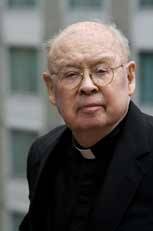In August 1946, some 70 young Jesuits gathered for summer school in a rambling wooden building that straddled a ridge on the border between western Maryland and Pennsylvania. They were members of the Maryland and New York provinces who before beginning the theological studies leading to ordination were teaching for a few years in one or other Jesuit high school.
Aug. 15, the feast of the Assumption of the Blessed Virgin Mary, was always the occasion for a festive dinner. On that day in 1946 there was something special to talk about. The New York Times reported that on the previous day, Avery Dulles, then almost 28 years old, had entered St. Andrew-on-Hudson, the Jesuit novitiate in Hyde Park, N.Y. He was the son of John Foster Dulles, a Wall Street lawyer and leading Presbyterian layman who in 1953 would become President Eisenhower's secretary of state.
Avery Dulles had graduated from Harvard in 1940 and became a Catholic a year later. While serving in the U.S. Navy from 1942 to 1946 he used his free time to write A Testimonial to Grace, an account of his conversion that has become a classic of its genre.
Jesuit novices in 1946 were given the title "Brother,” so during that Assumption Day dinner, one of the scholastics, in a burst of merriment, lifted a glass and cried, "A toast to Brother Dulles!”
When Avery Dulles, S.J., died on Dec. 12 last year, The Times of London called him "the most important American Catholic theologian of the 20th century.” He had been ordained in 1956 and in 1960, after graduate studies in Rome, he joined the faculty of Woodstock College, a Jesuit house of studies in Maryland. Most of his 25 books and 800 articles were written during the next 48 years. If the various translations of these works are also counted, the Dulles bibliography contains more than 2,000 entries. In recognition of his distinction as a theologian, Father Dulles was made a cardinal on Feb. 21, 2001.
In 1988 Avery Dulles became the first occupant of Fordham University's McGinley Chair in Religion and Society, a position he filled for the next 20 years.
During his naval service he had contracted polio. Although he recovered, by 2007 he was experiencing the effects of post-polio syndrome. This produced muscular atrophy that eventually made it impossible for him to walk, talk or swallow. In February 2008, therefore, he moved from the Fordham Jesuit community to Murray-Weigel Hall, the Jesuit infirmary next door to the Fordham campus in the Bronx.
Neither age nor infirmity, however, halted his intellectual apostolate. With the aid of Anne-Marie Kirmse, O.P., his research assistant since 1988, Cardinal Dulles put together during the last months of his life a selection of his writings that has just become available from Paulist Press under the title Evangelization for the Third Millennium.
The image of Avery Dulles nourished by a feeding tube but still at work is an emblem of Gospel ideals. After his death, someone talking to the physician who had overseen the cardinal's medical care in his final months remarked that although famous fathers rarely have famous sons, Avery Dulles had in his own way been as great a man as John Foster Dulles. The doctor, not himself a Catholic, made a correction. "Greater,” he said.
The son who venerated his father would probably have demurred, but history may not. In any case, "A toast to Cardinal Dulles!”








